The Transformer: Chuck Feeney ’56 Champions the Pleasure of Giving While Living
Resource type: News
Ezra: Cornell's Quarterly Magazine | [ View Original Source (opens in new window) ]
 Rendering of a portion of the future Cornell Tech campus on Roosevelt Island, showing the campus lawn, the first academic building (left) and the co-location buidling. Rendering: Luke Yoo/Morphosis
Rendering of a portion of the future Cornell Tech campus on Roosevelt Island, showing the campus lawn, the first academic building (left) and the co-location buidling. Rendering: Luke Yoo/MorphosisBy Emily Sanders Hopkins
He is Cornell University’s biggest donor.
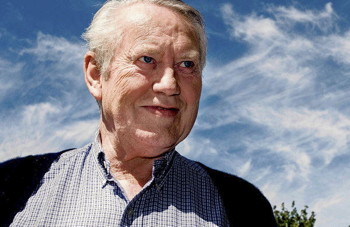 Chuck Feeney ’56. Image: Fennell Photography
Chuck Feeney ’56. Image: Fennell PhotographyThrough The Atlantic Philanthropies, the charitable foundation he seeded with nearly all of his wealth, Feeney has given Cornell approximately $1 billion. He is among the top three or four philanthropists in modern times, along with Warren Buffett, George Soros, Michael Bloomberg, and Bill and Melinda Gates. By 2020, he and Atlantic will have given away approximately $7.5 billion. The magnitude and impact of his generosity are a source of inspiration even to the world’s highest-profile philanthropists, such as Buffett and Gates, both of whom have said Feeney is a role model for how to give and how much to give. Quoted in a 2012 issue of Forbes, Gates said: “Chuck is fond of saying that none of us has all the answers, but I know that Melinda and I have learned a great deal from him in the time we’ve spent together.”
He is, you might say, a philanthropist’s philanthropist. But for more than two decades, until his authorized biography was published in 2007, almost no one had heard of him or knew about his massive, anonymous charitable giving.
‘Charlie’ Feeney from New Jersey
Friends and observers have described Feeney as shy, a fast walker, brilliant, fearless and tireless, quiet and deeply caring. He has striking blue eyes and a wry, quick wit.
Feeney grew up during the Great Depression in Elizabeth, New Jersey. He and his parents and two sisters made ends meet, sometimes just barely. No one in the Feeney family had attended college, and no one expected that Chuck would, either, let alone an Ivy League university. Nevertheless, he came to Cornell and went on to launch a successful global enterprise that made him a millionaire hundreds of times over.
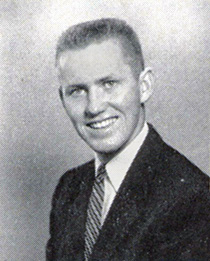 Chuck Feeney ’56 in his Cornellian yearbook portrait. Image: Division of Rare and Manuscript Collections.
Chuck Feeney ’56 in his Cornellian yearbook portrait. Image: Division of Rare and Manuscript Collections.According to Conor O’Clery’s best-selling biography, “The Billionaire Who Wasn’t: How Chuck Feeney Secretly Made and Gave Away a Fortune,” Feeney was already cheerfully industrious at an early age. He sold greeting cards door-to-door in elementary school, among other ventures. By the time he reached Cornell as an Air Force veteran (he’d volunteered for military service at age 17 in 1948), paying tuition with the help of the G.I. Bill, he had further honed his entrepreneurial talents.
He had decided to apply to Cornell after reading an article about the School of Hotel Administration titled “A School for Cooks” and thought to himself (as he recalls in O’Clery’s book), “I could do that, I could look after people.”
In his freshman year, Feeney launched a sandwich business on campus (feeding fraternities and sororities) so profitable that he was known by fellow students as “The Sandwich Man.” He’d stand outside the fraternity houses and blow a whistle to alert hungry people inside that now was the time to buy a snack.
He’d done the math: people were hungry, convenient late-hour food was scarce, many students had extra pocket money; he could buy bread, meat and cheese with a check on Friday night that would’t be cashed until the following Monday. His roommates and friends could be inveigled to help spread mustard and assemble the sandwiches.
By the time he graduated from the School of Hotel Administration, Feeney had sold thousands of sandwiches and made dozens of lifelong friends. He used his savings to travel to Europe and enroll in a graduate program in France, where he launched a lucrative summer camp for American military kids. In 1958, with fellow Hotelie Robert W. Miller ’55, he co-founded a duty-free shopping operation in Europe. Within a few years they expanded to Hong Kong, taking advantage of the fact that sailors and tourists were allowed to send home automobiles and up to five bottles of liquor as unaccompanied baggage, duty free, at a significant savings.
Building a giant cash machine, only to give it all away
Within a few years, thanks to nearly constant travel, remarkable attention to detail, the strategic bailout of a rival duty-free business, and cultivated relationships with liquor companies, car manufacturers and military personnel, Feeney and his partners had built an international business. It leveraged the strong American dollar and rising middle class, as well as burgeoning Japanese tourism and tax havens. Over the next three decades, Feeney and Miller’s Duty Free Shoppers (DFS) became the largest seller of luxury goods, cigarettes and liquor on the planet.
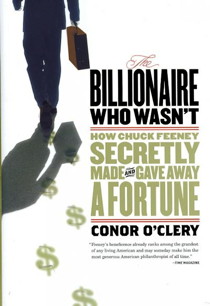 Image: provided.
Image: provided.By his 50th birthday, Feeney was extremely wealthy, making tens of millions a year. But he wasn’t interested in having the kind of lifestyle often associated with great wealth. Instead, he wanted to use his money to help people in need on a large scale (“It’s all about the people,” he often said).
In 1984, at age 53, he moved forward with a radical decision he’d been mulling for years – to give away virtually all of his personal wealth for the benefit of others. He quietly transferred the majority of his stake in DFS – estimated to be north of $500 million – to a charitable foundation he created. Business publications say Feeney was, at the time, perhaps the richest person to give away such a large percentage of his wealth.
Over time, what has really set him apart, though, is the entrepreneurial nature of his giving and the dramatic changes it has brought about within education and for children, the elderly and the marginalized in his chosen geographic regions – Ireland, Northern Ireland, Vietnam, Australia, South Africa, Bermuda and the United States.
While he was no longer personally wealthy, he was still always on the lookout for good partners and ways to leverage his resources to get a bigger bang for his buck, whether in business – still making decisions for DFS – or philanthropy.
What transformative giving looks like
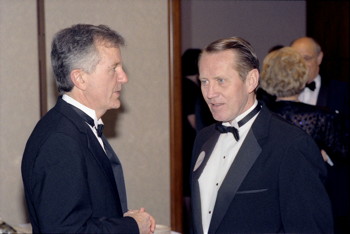 Feeney, right, with Jack Clark, then dean of the School of Hotel Administration, during Hotel Ezra Cornell in 1989. Image: Division of Rare and Manuscript Collections
Feeney, right, with Jack Clark, then dean of the School of Hotel Administration, during Hotel Ezra Cornell in 1989. Image: Division of Rare and Manuscript CollectionsFeeney has said that he didn’t want to give gifts that merely “tinkered at the edges.” Instead, he wanted to utterly transform things. This year, an article in the Australian Financial Review documented a recent explosion of philanthropy in Australia, giving much credit for the trend to Feeney and Atlantic, who have given approximately a half billion dollars to build or expand 25 biomedical research facilities in Australia since the late 1990s. “He strong-armed governments,” the reporter writes of Feeney’s Australian giving, “to give matching grants and gave in the wake of the global financial crisis when the money was most needed and went the furthest.”
Another example of Feeney’s habit of using leverage is found in Atlantic’s efforts to revamp Ireland’s higher education system starting in the 1980s. At the time, Irish universities were underfunded and ranked poorly worldwide, and the Irish economy was so weak that young people were leaving in droves. Feeney began by asking a few university presidents to think big and come up with bricks-and-mortar projects capable of redefining research in Ireland, but he placed a condition on his gifts: They’d have to raise big money from other sources, including the Irish government, to claim matching funds from Atlantic.
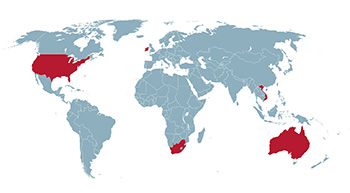 Chuck Feeney and The Atlantic Philanthropies’ giving has been concentrated in Ireland, Northern Ireland, Vietnam, Australia, South Africa, Bermuda and the United States
Chuck Feeney and The Atlantic Philanthropies’ giving has been concentrated in Ireland, Northern Ireland, Vietnam, Australia, South Africa, Bermuda and the United StatesThat first foray blossomed into Atlantic’s investment, over the next 25 years, in every university in Ireland, and more recently in secondary schools in Northern Ireland. The foundation has now funneled some $800 million to Irish schools and several hundred million more to other Irish institutions, while leveraging much more from the Irish government. The Irish educational system has since jumped at least 20 spots in international rankings, research output has grown in leaps and bounds, and the economy became more robust and able to weather the global downturn with improved resilience.
In 2012, for the first time in history, the nine universities of Ireland, north and south, together conferred an honorary degree on Feeney.
Atlantic has built schools and hospitals in Vietnam, improved the health care system and advocated for human rights in South Africa, advanced cutting-edge medical research in San Francisco, and with money from his own pocket, Feeney played a significant role in the peace process in Northern Ireland in the 1990s. Feeney’s and Atlantic’s philanthropy has had a transformative effect on whole sectors of national economies and on entire regions.
Atlantic Philanthropies at Cornell
What would Cornell University look like without Feeney and The Atlantic Philanthropies? For starters, it probably would not have Cornell Tech, since Atlantic’s down-to-the wire gift of $350 million was a major factor in Cornell’s winning bid to New York City for a tech campus in 2011. The gift made headlines around the world and is the largest single gift designated to one purpose in Cornell’s history. (In fact, it is one of the largest gifts ever given to any university, topped only by a handful of $400 million gifts and one gift of $600 million from the Gordon and Betty Moore Foundation to the California Institute of Technology in 2001, according to The Chronicle of Higher Education.)
But Atlantic’s giving at Cornell started much earlier, and much more quietly.
“There is likely no better example of Chuck Feeney’s commitment to ‘giving while living’ than Cornell University, his alma mater, and the recipient of the first grant The Atlantic Philanthropies ever made,” said Chris Oechsli, president and CEO of The Atlantic Philanthropies. That first grant, in 1983, launched the Cornell Tradition, a fellowship program that recognizes and offers programming and book stipends to students with “a strong work ethic, service involvement and academic achievement.” Atlantic has since given millions more to the program and has been joined by hundreds of other donors, who together have named 263 additional Tradition fellowships. To date, 4,315 Tradition fellows have given more than one million hours of public service to the community since the program’s inception and have helped enhance the campus’s decidedly public service-focused culture.
Without Feeney and Atlantic, there also would be a lot fewer scholarships. The $50 million the foundation made available for a scholarship campaign starting in 1990 was contingent upon the university’s ability to raise $150 million from others. All told, over 450 alumni, parents, friends, corporations and foundations created or enhanced more than 800 scholarships.
Atlantic’s support for faculty has included tens of millions of dollars in bridging funds that allowed for new hiring of dozens of professors. Atlantic’s support has allowed the university to recruit and retain many of the most extraordinary faculty on campus today, to think broadly about academic priorities most important to the university’s future, and to make investments needed to pursue them.
Atlantic’s commitment in 1999 to Cornell’s Residential Initiative permitted the university to move forward with a bold, expensive plan, under the leadership of then-President Hunter Rawlings, to house all first-year students on a renovated North Campus – and to rebuild West Campus, where five new living/learning houses offer students in the sophomore year and beyond an attractive on-campus housing option. The initiative also put in place a strong program to incorporate academics into residential life, creating more opportunities for informal student-faculty interaction. The residential plan has been one of the great Cornell success stories in recent decades – enriching campus life, creating a stronger academic community and underscoring the importance of faculty mentoring of undergraduates.
Cornell President David Skorton told Ezra magazine that his years as president “have been punctuated by absolutely terrific, transformational moments when Chuck and The Atlantic Philanthropies stepped in and offered partnership, leadership and support.
“The beneficial effects Cornell University will have on the lives of its students, alumni and people in every corner of the planet have been multiplied by Chuck’s generosity and by his quiet, powerful commitment to making the world better.”
The pledge
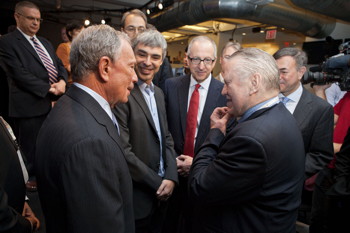 From left, then-New York City Mayor Michael Bloomberg, Google co-founder and CEO Larry Page, Cornell President David Skorton, Feeney and Robert Harrison ’76, chairman of the Cornell Board of Trustees, at a May 2012 press conference announcing that Cornell Tech would have its first physical space, free of charge, in a New York City building owned by Google
From left, then-New York City Mayor Michael Bloomberg, Google co-founder and CEO Larry Page, Cornell President David Skorton, Feeney and Robert Harrison ’76, chairman of the Cornell Board of Trustees, at a May 2012 press conference announcing that Cornell Tech would have its first physical space, free of charge, in a New York City building owned by GoogleEven though he had transferred virtually all of his and his family’s assets more than 25 years earlier, in 2011 Feeney became a signatory of the Giving Pledge. Created by Buffett and Gates, the pledge aims to motivate the wealthiest individuals in America to commit to giving the majority of their wealth to the philanthropic causes and charitable organizations of their choice Ð preferably while the donors are still alive. Feeney has wryly observed that it is very difficult to enjoy philanthropy once you are dead.
“Try it,” he has said about giving while living – “you’ll like it.”
“While Chuck’s theory is a simple one – that donors will get more satisfaction from their giving if done while they are living – the impact of the philosophy is immeasurable,” Oechsli said. “Though hard to quantify, the impact can be seen in healthier, better educated, more peaceful communities where people have increased access to opportunity and are treated with dignity and respect.”
This past June, Feeney was honored with the Forbes 400 Lifetime Achievement Award for Philanthropy, presented to him by Buffett, who told the assembled public officials and philanthropists that Feeney was not only his hero, but also Gates’ hero, and that “he should be everybody’s hero.”
“It’s simple, really,” Feeney said on the occasion of receiving the Forbes award. “You get more satisfaction from giving while you’re alive and involved. You learn and make adjustments to achieve the highest and best use of your resources. You get to see what you’ve helped accomplish. I am grateful that, by giving me this award, Forbes is encouraging other successful businessmen and women to more fully engage in philanthropy in their lifetimes.”
Feeney once famously told The New York Times, “I want the last check I write to bounce.”
There will probably be no such drama, but The Atlantic Philanthropies is planning to spend down its funds by 2020.
President Emeritus Frank H.T. Rhodes, who led Cornell from 1977 to 1995, served on the board of The Atlantic Philanthropies from 1995 to 2008 and chaired it from 2000 to 2008.
“The award of the Forbes 400 Lifetime Achievement Award to Chuck Feeney is yet another fitting tribute to his extraordinary generosity,” Rhodes told the Cornell Chronicle in June. “A score of areas at Cornell bear witness to his anonymous generosity. Quietly, thoughtfully, steadily, Chuck continues to enrich and improve the life of our university. This is one of the very rare occasions when we can publicly acknowledge him as Cornell’s foremost benefactor.”